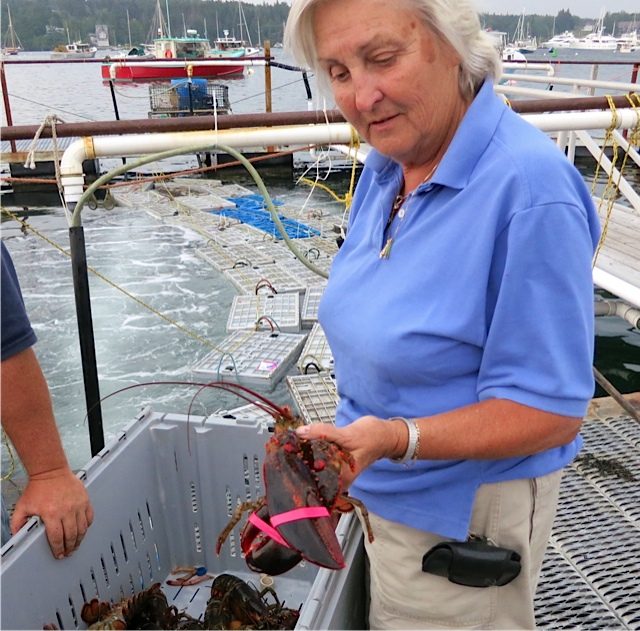
I said, “I know I can do this.” The next thought was, “I don’t know if I can do this.” But I was determined to do it, so I did it.
1. What led you to the mission of being a lobster fisherwoman?
I grew up until about the age of ten in Brooksfield, Maine. It’s on the other side of Blue Hill. My next-door neighbor had traps. 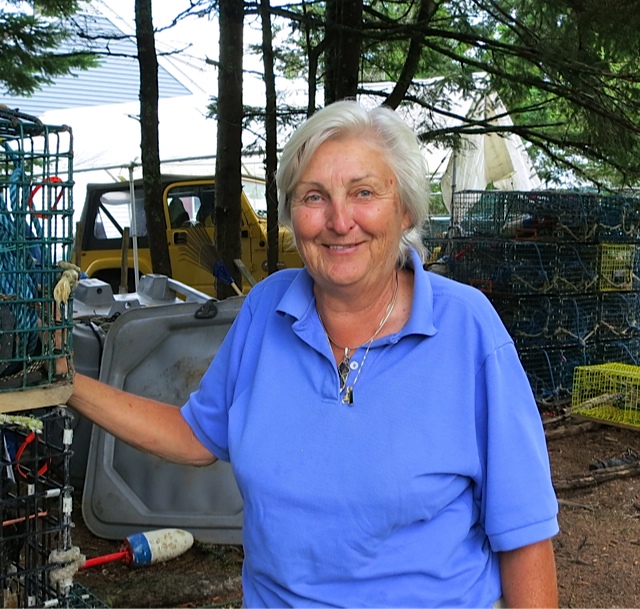 I remember all that – seeing his traps. My first husband was a fisherman. I lived out at Frenchboro, Long Island, Maine, seven miles out into the ocean. With my first husband, I had little kids and only got out in a great while. I wasn’t able to go with the kids because there was no place to leave them on the island. There were only like fifty people. Isolated. We didn’t even have phone service at that time. Did have electricity, though. Ferry service once a week. It came in on the State Ferry one day, spent the night and went back the next day. Unless you came with someone else, you came in your own boat.
I remember all that – seeing his traps. My first husband was a fisherman. I lived out at Frenchboro, Long Island, Maine, seven miles out into the ocean. With my first husband, I had little kids and only got out in a great while. I wasn’t able to go with the kids because there was no place to leave them on the island. There were only like fifty people. Isolated. We didn’t even have phone service at that time. Did have electricity, though. Ferry service once a week. It came in on the State Ferry one day, spent the night and went back the next day. Unless you came with someone else, you came in your own boat.
Then I got divorced and met Mr. Pierce and he thought that I could go fishing with him. It was a dream of his to have his wife with him. That’s when I got to be sternman. When I married Leon, he was a fisherman and he also had 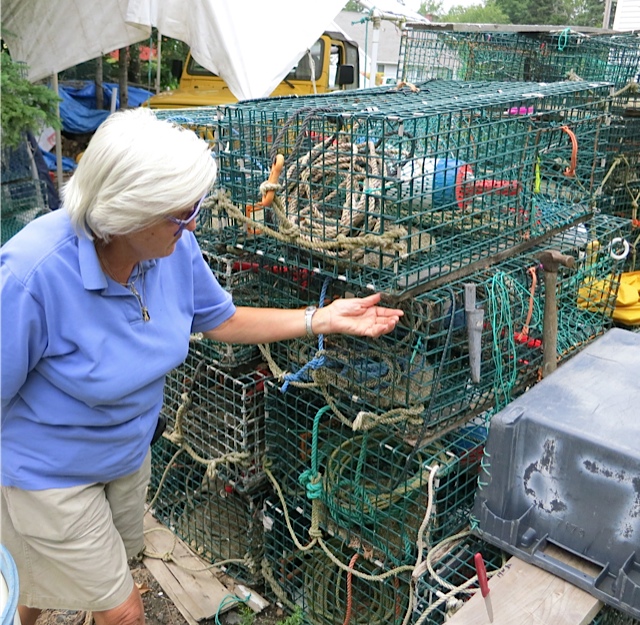 scallops. We did scalloping one winter – which is hard work – busy work. The drag is down ten minutes, and then it’s up. Well you’ve got to clear the table, pick up the scallops, and try to shock them, and the next thing you know it’s time to take the drag up again. He loved to go shrimping. Shrimping is in the winter time only, colder work, but not as much work to it. Like, you drag for an hour or an hour and a half, take up, and you have a lot of shrimp. We always picked everything over. So you’d work a half an hour and go sit down for a half an hour and take a nap or whatever.
scallops. We did scalloping one winter – which is hard work – busy work. The drag is down ten minutes, and then it’s up. Well you’ve got to clear the table, pick up the scallops, and try to shock them, and the next thing you know it’s time to take the drag up again. He loved to go shrimping. Shrimping is in the winter time only, colder work, but not as much work to it. Like, you drag for an hour or an hour and a half, take up, and you have a lot of shrimp. We always picked everything over. So you’d work a half an hour and go sit down for a half an hour and take a nap or whatever.
Once we went out and it was like zero degrees. The shrimp freeze when you shovel them up on the table. You see, I had to shovel them up on the table and we’d pick them all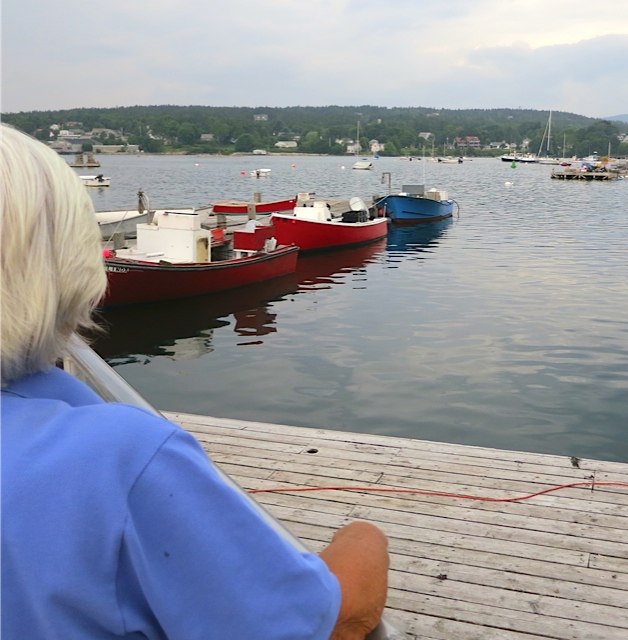 over and put them in trays. In the morning, before we set, we went out to get the net to set and it was froze on the net reel – a big long thing across the boat that the net would reel up on. The spray was on it and of course it had frozen. So we both had to get out there and pull and pull to get the net off.
over and put them in trays. In the morning, before we set, we went out to get the net to set and it was froze on the net reel – a big long thing across the boat that the net would reel up on. The spray was on it and of course it had frozen. So we both had to get out there and pull and pull to get the net off.
But most of the time it wasn’t that cold. You know, because you’re basically not going out shrimping if it’s blowing really hard. You know, it’s a pretty calm day, maybe wind ten or fifteen mile an hour – or you might be out there and the wind picks up and have to come home in some wind and seas.
Most of the time we went right out here in the bay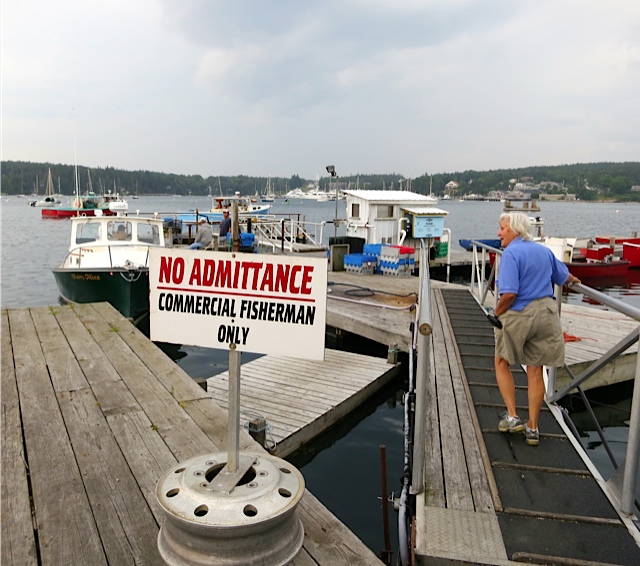 – you go down to Thunder Hole and you look out there – most of the time there. Sometimes we’d fish there so long and then you’d say, “Well I’ve got to go to Long Island (Maine).” Which from Southwest Harbor to Long Island – well, it took us about a good hour and twenty minutes to get outside of outer Long Island to go shrimping. There are two Long Islands here in Maine. There’s inner Long Island which is off Blue Hill and Surrey and there’s an outer Long Island seven miles out to sea from Bass Harbor.
– you go down to Thunder Hole and you look out there – most of the time there. Sometimes we’d fish there so long and then you’d say, “Well I’ve got to go to Long Island (Maine).” Which from Southwest Harbor to Long Island – well, it took us about a good hour and twenty minutes to get outside of outer Long Island to go shrimping. There are two Long Islands here in Maine. There’s inner Long Island which is off Blue Hill and Surrey and there’s an outer Long Island seven miles out to sea from Bass Harbor.
2. What does being a lobster fisherwoman mean to you?
I enjoy doing it. There’s kind of like an exhilaration or I haven’t found the word yet to describe the feeling of just liking to do it, enjoy doing it, and watching those traps 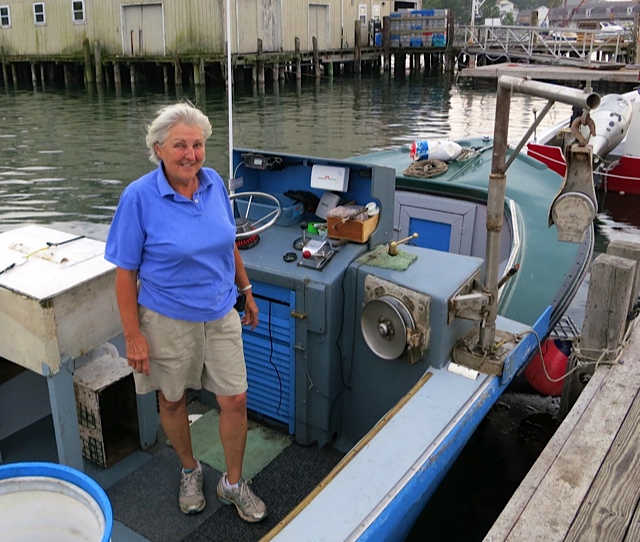 come out to see if there’s anything in it. Now yesterday, I had a small trap, what we call a mousetrap, like the old fashioned one – that pretty much was the size people used twenty years ago or fifteen years ago. Then some of these guys had to go a little bigger, then a little bigger, you know. Then everybody followed suit. I had two lobsters in the parlor end, two that probably went close to two pounds, two that were close to I’d say a pound and a half, and then three more that were just the normal pound and a quarter of lobsters in there. When that trap breaks the water, it’s like, “Ooo! It’s just all lobster!” Here’s all these lobsters in that tiny little trap. It’s just a feeling.
come out to see if there’s anything in it. Now yesterday, I had a small trap, what we call a mousetrap, like the old fashioned one – that pretty much was the size people used twenty years ago or fifteen years ago. Then some of these guys had to go a little bigger, then a little bigger, you know. Then everybody followed suit. I had two lobsters in the parlor end, two that probably went close to two pounds, two that were close to I’d say a pound and a half, and then three more that were just the normal pound and a quarter of lobsters in there. When that trap breaks the water, it’s like, “Ooo! It’s just all lobster!” Here’s all these lobsters in that tiny little trap. It’s just a feeling.
I’ve always, like I’ve said, been near the salt water – even when my parents divorced and my mother ended up in Florida, we were near the water in St. Augustine – and just about every place I could walk to the inland there was salt water. So, I’ve always been around salt water. Of course living out at Long Island (Maine) I was surrounded by water.
Two fisherman – married! I missed being on the water after he died. Missed being in the boat. Missed watching the traps come up. And then I decided first it was, “Yes I can do this.” Then it was like, “What am I doing? I don’t know if I can do this! I didn’t pay that much attention. When I was with him.” I always told him, “Well when you’re done, I’m done.” But, that just didn’t come about.
I just decided I missed being on the water and in a boat and so then I decided next summer after he passed, I looked around for a boat and it wasn’t a very good looking boat, 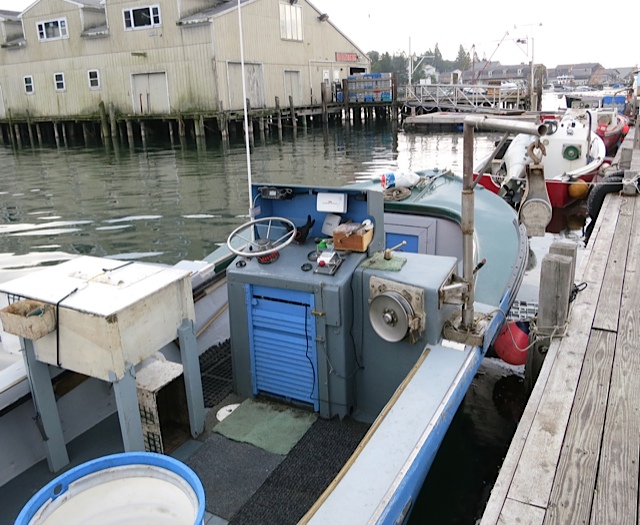 but it was the only one I’d found. I wanted to get it and get something and get going on by July, so I went down outside of Brunswick. My cousin went with me – there was a little caution there. We found one and towed it home. And then I painted it, used putty, and used a can of Bondo, It wasn’t very pretty looking you know! I young kid had it — you know, wear and tear. Everything on it was worn out! So, that’s how I decided to do it. I said, “I know I can do this. I can catch something. I’ll just have a few traps out.” Then the next thought was, “Well, what am I doing. I don’t know if I can do this.” But I was determined to do it, so I did it.
but it was the only one I’d found. I wanted to get it and get something and get going on by July, so I went down outside of Brunswick. My cousin went with me – there was a little caution there. We found one and towed it home. And then I painted it, used putty, and used a can of Bondo, It wasn’t very pretty looking you know! I young kid had it — you know, wear and tear. Everything on it was worn out! So, that’s how I decided to do it. I said, “I know I can do this. I can catch something. I’ll just have a few traps out.” Then the next thought was, “Well, what am I doing. I don’t know if I can do this.” But I was determined to do it, so I did it.
At first I was the only woman around the dock. Later, there was another married couple and she used to go fishing. That’s all that I knew of back in ’85, ’86, ’87. Every harbor now has some younger women who fish for lobster. It’s not just for men any more. I think it’s just the whole thing of what women can think they can do. Whereas before you were a secretary, or you were a teacher, or you were a dental assistant, or a waitress. Now women grow up knowing they can do whatever they want to do – a whole different mental outlook I guess, or attitude of what people could and should be able to do.
Things have changed. There’s more basically younger women going as sternmen – do you say sternman or sternwoman or a sternperson? (See descriptions of Lobster fishing job descriptions by clinking on this sentence.) A sternperson goes with the person who owns the boat and all the gear and helps aboard the boat. He or she picks up the traps and generally does the measuring. There are some fishermen who don’t want their sternperson measuring, in case they don’t measure and get a short one. They might band the lobsters and help when things are done like unloading the lobsters and getting the bait for the next day.
Three and a quarter inches is the shortest size we can take and up to five inches is the maximum. You measure down the carapace from the eye socket straight line down the 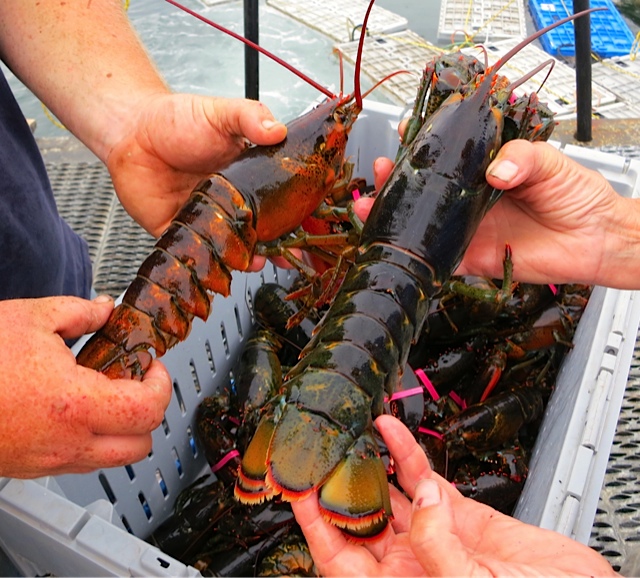 back to the tail. You get to the point where you can tell. I probably measure more than I need to, but I don’t want to be caught with a short lobster. The warden service can be on the dock if they want and check the lobsters are you’re unloading. They can come aboard your boat. There is a law that if they come along side your boat and request to come aboard and you refuse them to come aboard they can give you, I think it was, a fine, or something. I didn’t know that before. In twenty two years of fishing, once they were out in the sound and we had a dozen or more lobsters in the pound and they just asked to come aboard. I remember twice when we came in at the dock, they were checking the lobsters.
back to the tail. You get to the point where you can tell. I probably measure more than I need to, but I don’t want to be caught with a short lobster. The warden service can be on the dock if they want and check the lobsters are you’re unloading. They can come aboard your boat. There is a law that if they come along side your boat and request to come aboard and you refuse them to come aboard they can give you, I think it was, a fine, or something. I didn’t know that before. In twenty two years of fishing, once they were out in the sound and we had a dozen or more lobsters in the pound and they just asked to come aboard. I remember twice when we came in at the dock, they were checking the lobsters.
3. What was your best day as a lobster fisherwoman?
I don’t think of it as a best day or really as a bad day. Every day is a fun good day. Some days you catch more lobsters than some other days. Like yesterday pulling up that trap with those seven lobsters and four nice big pretty lobsters. To me a big new shell lobster is pretty. Just the thrill of 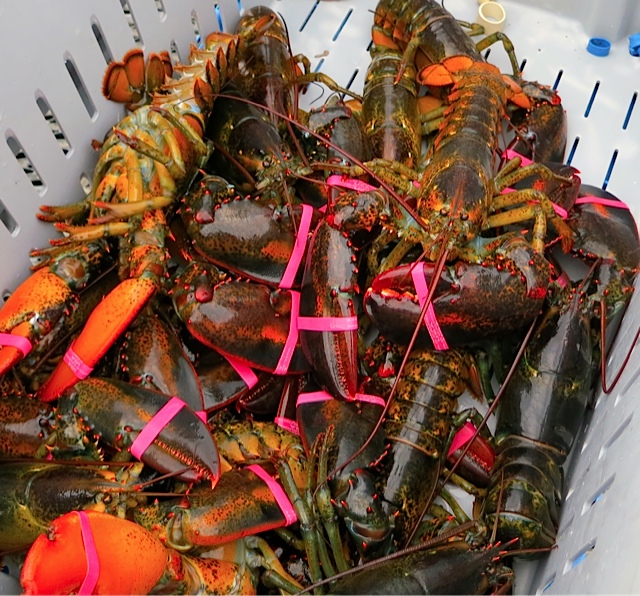 seeing that come up. And picking out those bugs. They call them bugs.
seeing that come up. And picking out those bugs. They call them bugs.
Don’t ask me how they got the word bugs. I’m sure it was way back when. Old timers thought they looked like bugs crawling around. I don’t know. They call the undersize lobsters snappers. And that I can see because the claw that has those little sharp teeth on it — that’s the quick claw. It’s fast. If they were to catch their own food, it’s very fast. It’s sharp to hold on. When they are using it, it sounds like snap, snap, snap, snap – that little claw. I can see where they got the name snapper for the little ones, but I don’t know where they got the word bug.
Here’s a short story. We were out in deeper water fishing one day, and I was standing there waiting for the trap to come up and then all of a sudden I’m looking, you know, I’m not paying any 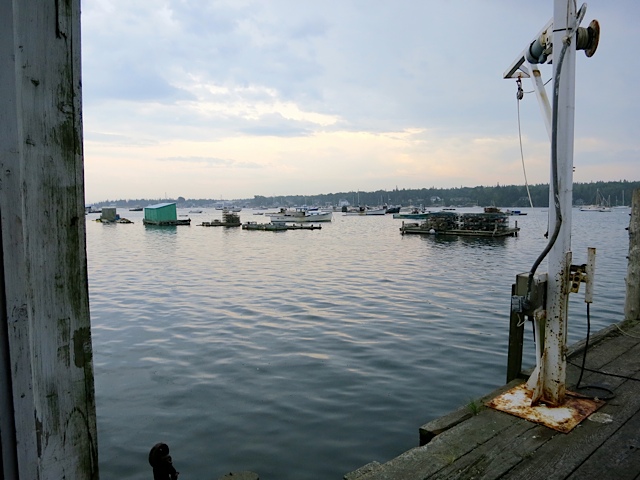 attention, and this whale just slides right by the side of the boat about six or seven feet from the boat. It was just an awesome sight and kind of like on of those awe inspiring moments just to see that whale. It wasn’t a huge whale — oh, about twenty feet long or something, just gently sliding by the side of the boat. Your mouth drops open. It’s like, “Ah! Look at that!” It was just one of those moments out there fishing just to see that wonderful creature going by the side of the boat. He knew we were there and it was like all of a sudden you see it. I don’t want to say it inspired me, but it was just so neat. Awesome to see that! We were out in deeper water. It wasn’t in near the shore. We were probably six or seven miles outside of land. We’ve seen little minke whales a mile or so from shore. They used to come in and you could see it if you had glasses. But this time seeing this big whale was out further. That was probably one of the most joyful things to see that.
attention, and this whale just slides right by the side of the boat about six or seven feet from the boat. It was just an awesome sight and kind of like on of those awe inspiring moments just to see that whale. It wasn’t a huge whale — oh, about twenty feet long or something, just gently sliding by the side of the boat. Your mouth drops open. It’s like, “Ah! Look at that!” It was just one of those moments out there fishing just to see that wonderful creature going by the side of the boat. He knew we were there and it was like all of a sudden you see it. I don’t want to say it inspired me, but it was just so neat. Awesome to see that! We were out in deeper water. It wasn’t in near the shore. We were probably six or seven miles outside of land. We’ve seen little minke whales a mile or so from shore. They used to come in and you could see it if you had glasses. But this time seeing this big whale was out further. That was probably one of the most joyful things to see that.
It’s always fun to see porpoises. One time we had a bunch of little baby porpoises. They weren’t more than three feet long – even sometimes I see them up the sound in my little boat. But it is always fun to see the creatures like that – the sea animals when you are fishing – at least it is to me. It’s an enjoyable thing to see those little things – even seals. They always look up and you have that feeling that there is one of God’s creatures in the ocean with me.
There’s like a connection to the sea. Either you love it or you don’t. People who have not been around the sea, the ocean, or had anything to do with it, probably simply don’t understand the feeling you have with it. The first time I went to St. Louis, where my son went to college, we were going to his graduation and spent a week. We took a trip and went up into Kansas. I said one day, “You know what I miss? Water. The ocean.” Even seeing lakes. There’s basically no water. We’d go by a sign and it would say, “Such and such creek.” But there was no water in it. I guessed they were just little creeks and then they dry up. My son said he missed the same thing – seeing water, not just the ocean but seeing a body of water. People who don’t really have that much water, don’t get that connection, I guess.
The other day I was out of the sound, the sun was shining, the sky was clear blue, and there was no wind. It was just a beautiful, pretty day. That was a great day. Just being on the water and just pulling traps. To me, really, no extra exceptional good days and no really bad days. If I have a good catch, like yesterday, I had about two hundred and twenty pounds. That’s the most I’ve had this year. I didn’t haul them all. I got a rope in the wheel and I started to clear that out and then I heard my little Honda engine that runs the hydraulics for the hauler. I hadn’t filled the tanks solid full and it was going, “Ta chit, ta chit”, and I said, “Oh that’s going to die.” So I shut that off and I said, “That’s it. I’m just going home.” But it wasn’t a bad day. I didn’t see it as a bad day. I had to take my granddaughter to her dance lesson, so could have finished all of them, but I would have had just time enough to take a shower and sit down for five minutes. But I said, “I’m just going home.” But I didn’t call it a bad day.
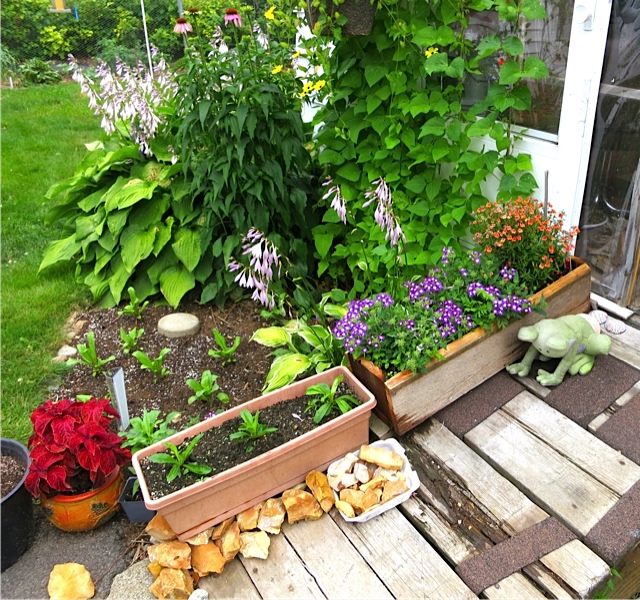 (Note: Pamela is resourceful at home, not just on the ocean. Here is another part of the interview.) I made this plant window box here. I had some lumber from my father and it’s cedar. I wanted to leave the rustic edge so I slapped it together, but I fouled up! I should have had that edge up top. That’s my rustic lumber! I may make another one to go with that one.These are scarlet runner beans.
(Note: Pamela is resourceful at home, not just on the ocean. Here is another part of the interview.) I made this plant window box here. I had some lumber from my father and it’s cedar. I wanted to leave the rustic edge so I slapped it together, but I fouled up! I should have had that edge up top. That’s my rustic lumber! I may make another one to go with that one.These are scarlet runner beans.
That’s my garden. I had to put this fishnet around the garden because of the deer. My potatoes didn’t come very good. 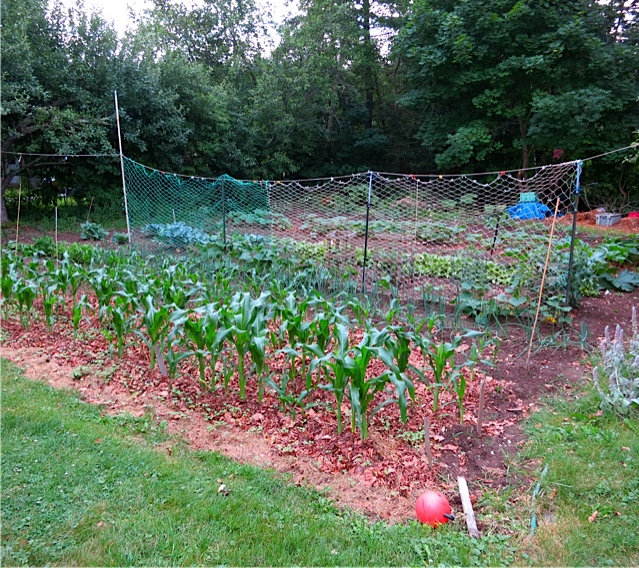 I planted them on a Sunday and two days later we had a lot of rain. This is all ledge, solid rock under here. It stayed wet and you can see all the potatoes that have rotted. It’s a ledge because it is all one great big piece of rock under the garden. I think my husband brought in almost all of this dirt. He had a lot of fill put in there to make the garden. It’s looking pretty good right now. There’s buttercup squash, one pumpkin up there, a zucchini. Those things grow too darn fast! I think that grew since yesterday. My beets, I’ve got to get them thinned. I did quickly thin the rutabaga.
I planted them on a Sunday and two days later we had a lot of rain. This is all ledge, solid rock under here. It stayed wet and you can see all the potatoes that have rotted. It’s a ledge because it is all one great big piece of rock under the garden. I think my husband brought in almost all of this dirt. He had a lot of fill put in there to make the garden. It’s looking pretty good right now. There’s buttercup squash, one pumpkin up there, a zucchini. Those things grow too darn fast! I think that grew since yesterday. My beets, I’ve got to get them thinned. I did quickly thin the rutabaga.
I also teach people about lobsters and fishing at the Oceanarium. It’s called the Oceanarium, Lobster Hatchery, and Marsh Walk in Bar Harbor. 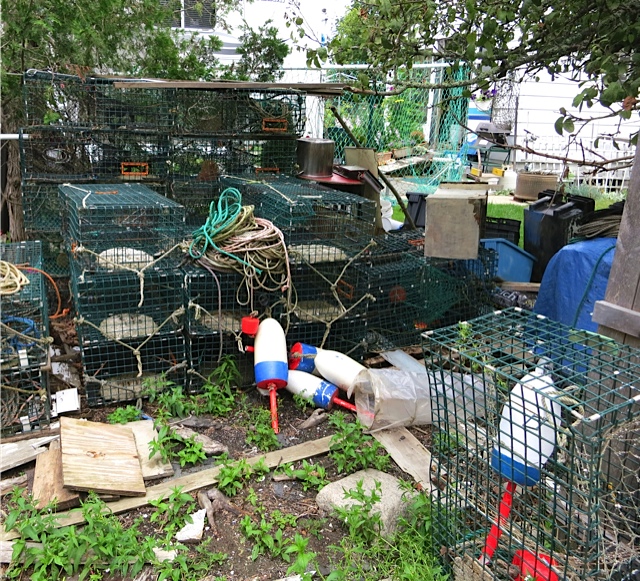 It is very interesting. They explain how the lobster fans off her eggs and they collect them every morning and they have to keep them in these tall tanks with the water bubbling and going. The little babies are going constantly because if they don’t and bump each other, they will eat themselves because they are cannibalistic. They keep them there until stage four and look like a lobster. That’s when they will settle down onto the bottom. From stage one to four, they are in the plankton stage – free floating up on top of the water and down in the water. They are feed for everything else. When they finally get to stage four, they settle down on the bottom and find hiding places.
It is very interesting. They explain how the lobster fans off her eggs and they collect them every morning and they have to keep them in these tall tanks with the water bubbling and going. The little babies are going constantly because if they don’t and bump each other, they will eat themselves because they are cannibalistic. They keep them there until stage four and look like a lobster. That’s when they will settle down onto the bottom. From stage one to four, they are in the plankton stage – free floating up on top of the water and down in the water. They are feed for everything else. When they finally get to stage four, they settle down on the bottom and find hiding places.
The Oceanarium then shoots them out into the ocean. They did this by trial and error. They first were just dumping them overboard, but by the time they would sink to the bottom, they were being eaten. If they just shoot them down the holes and don’t move it, crabs or whatever were waiting there for the lobsters to come out of the little tube and then they eat them. They found that by putting a sophisticated rock on the end of that tube and dragging it across the bottom, then the lobster have a better chance to survive in the ocean. So, when they come out of the tube and there is a rock on the end, there might not be a predator right there.
They have a video that shows how they do it – putting the lobsters right on the ocean floor. You can see the babies in those tubes and the different stages. They feed them brine shrimp. It’s interesting. They also have a touch tank showing you sea cucumbers, sea stars, sea urchins, and horseshoe crabs. The horseshoe crabs are pretty interesting creatures. It’s a prehistoric one. They take the blood form the horseshoe to use it for medicine. They use it for people and it comes from horseshoe crabs. They put the crabs back into the water after they are done extracting the blood. (See an article on how and extract of the horseshoe crab’s blood is used by the pharmaceutical and medical industry to ensure their products such as intravenous drugs, vaccines, and medical devices are free of bacterial contamination. The horseshoe crabs are like blood donors and are not killed in the process. Their chitin can be used for suturing the wounds of burn victims. It may reduce the healing time by 35 to 50 percent. http://www.horseshoecrab.org/med/med.html)
4. What was your worst day as a lobster fisherwoman?
In all my years of fishing? It’s the same thing. I don’t see it as worst. Some days are better than others. But I don’t see them as really bad worst days. Even when in the big boat maybe something broke down and you had to quit, that’s just the way it was. That’s the way it is. Just like now, the price of lobsters is down so low. The big guys are growling because the price is low, but look at it on the bright side, the price is low, but they’re catching far more lobsters than they did when the price this time last year was probably close to three dollars. So you are still ahead of the game. That’s the way it is. You catch too many lobsters — you know the price is going to go down. Supply and demand. That’s all I can tell you. Keep a happy outlook. Don’t look at things as being bad and the worst. Just look for the good.
5. How did you survive your worst day?
How do I cope with a bad day? Well, basically I don’t see any bad days, so I don’t have to cope with it. If you’re 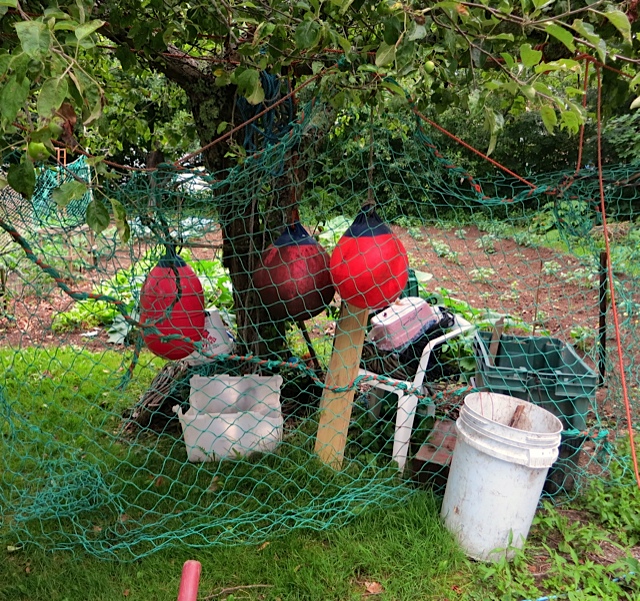 looking for a bad day, you’re going to have a bad day. It’s going to come out to you with a bad day. I just look at it as – the first year I was out there it was a little windy and it was my fault. I got my warp in the wheel and I didn’t realize that I had it in there. (Note: Warp is a heavy rope.) In this case, the propeller got caught in the warp. The rope was attached to the trap. Each trap has one rope, one float, one buoy. I needed the hauler to go more and I burst a hose. It was my fault. It wasn’t a good day and I just came in a little disgusted because I had done it to myself. The hose when I got it had a chafe mark and that’s where it burst. I should have changed it. But I didn’t call it a worst day. It was an experience. I should have paid attention and changed the whole thing before I even put the boat in the water.
looking for a bad day, you’re going to have a bad day. It’s going to come out to you with a bad day. I just look at it as – the first year I was out there it was a little windy and it was my fault. I got my warp in the wheel and I didn’t realize that I had it in there. (Note: Warp is a heavy rope.) In this case, the propeller got caught in the warp. The rope was attached to the trap. Each trap has one rope, one float, one buoy. I needed the hauler to go more and I burst a hose. It was my fault. It wasn’t a good day and I just came in a little disgusted because I had done it to myself. The hose when I got it had a chafe mark and that’s where it burst. I should have changed it. But I didn’t call it a worst day. It was an experience. I should have paid attention and changed the whole thing before I even put the boat in the water.
Some of it was living fourteen years on an island where I was isolated. You come to the mainland for supplies. You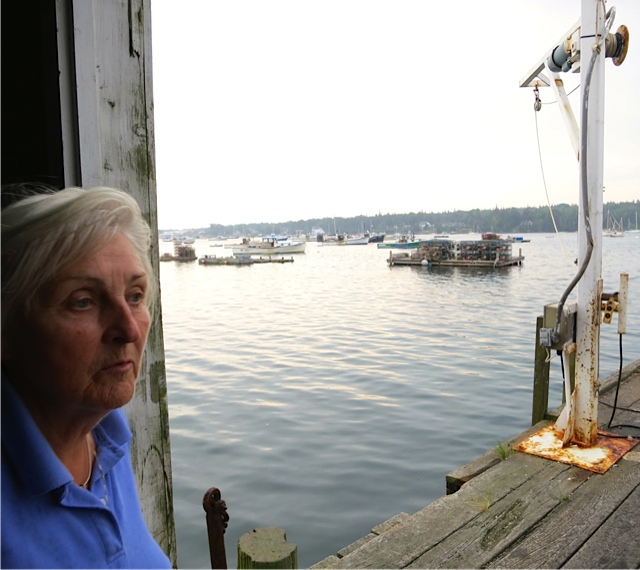 forget something and you can’t just turn around and go to the store again. You’ve got to plan ahead. Some people say, “Oh, I could never live on an island! You can’t get into your car and go any place you want to. Or what about if you get sick? You need to get to a doctor quick and stuff.” My answer was, “Well, in the fourteen years that I was there, nobody died because they were on an isolated island and couldn’t get to the mainland. I mean, it’s got to be a really, really, bad, bad, wind or storm that you couldn’t get off the island. Being down there at that time, everybody helped everybody else out. Like if someone called and said, “I need to get to the main land and someone is really sick and needs to get off of here.” There’d be somebody that would come along and say, “We’ll go in my boat.” Two or three of the guys came and off you would go.
forget something and you can’t just turn around and go to the store again. You’ve got to plan ahead. Some people say, “Oh, I could never live on an island! You can’t get into your car and go any place you want to. Or what about if you get sick? You need to get to a doctor quick and stuff.” My answer was, “Well, in the fourteen years that I was there, nobody died because they were on an isolated island and couldn’t get to the mainland. I mean, it’s got to be a really, really, bad, bad, wind or storm that you couldn’t get off the island. Being down there at that time, everybody helped everybody else out. Like if someone called and said, “I need to get to the main land and someone is really sick and needs to get off of here.” There’d be somebody that would come along and say, “We’ll go in my boat.” Two or three of the guys came and off you would go.
When you are on the water, you can’t be mad. You have to control your temper. You can’t do something stupid 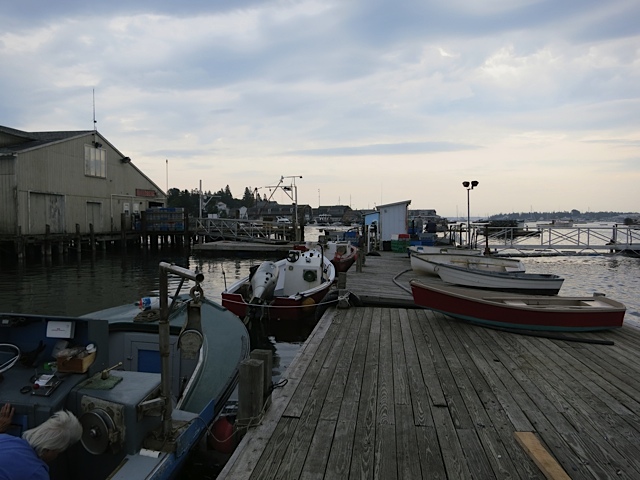 because you are on the water. That’s a different situation than being here on the land and your car breaks down and you get out and smash it all to pieces. Well, you can stand there until somebody picks you up and takes you home. Out on the water, you can’t do that. The boat’s going to drift or you might end up poking a hole in it and you’re going to sink. So you can’t be that way on the water. It just doesn’t pay. Go with the flow. I know as I have gotten older, things just don’t seem to bother me as much. It’s part of life and you move on. You can’t dwell in the past.
because you are on the water. That’s a different situation than being here on the land and your car breaks down and you get out and smash it all to pieces. Well, you can stand there until somebody picks you up and takes you home. Out on the water, you can’t do that. The boat’s going to drift or you might end up poking a hole in it and you’re going to sink. So you can’t be that way on the water. It just doesn’t pay. Go with the flow. I know as I have gotten older, things just don’t seem to bother me as much. It’s part of life and you move on. You can’t dwell in the past.
- « Previous person: Fona York
- » Next person: Michael “Mac” MacDonald